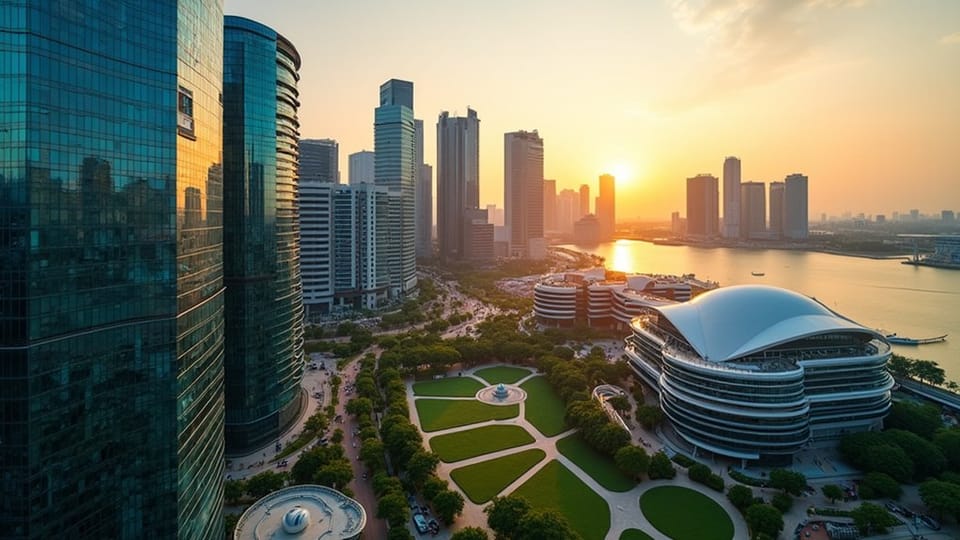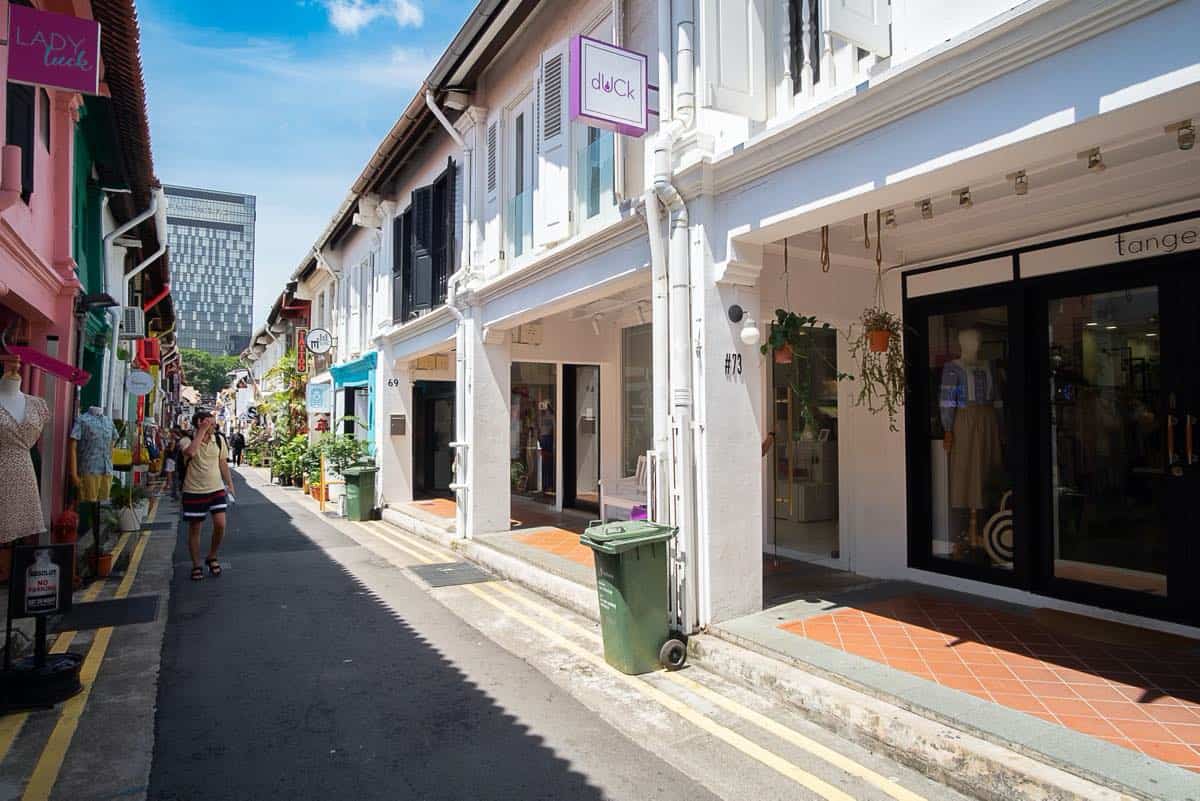Simple Guide to Buying Commercial Property in Singapore

Singapore’s commercial real estate scene isn’t just about spotting the right building—it’s about understanding property ownership laws, knowing the zoning classifications, and timing your move just right. You’re at the crossroads of one of Asia’s most lucrative commercial property markets, where one smart decision can transform your investment portfolio forever.
Understanding Commercial Property Types and Classifications in Singapore
Diving into Singapore’s commercial property market means getting familiar with the key property types and classifications—which serve as your roadmap for smart investment choices.
First things first: a commercial property is a place primarily used for business—whether generating steady rental income or making a tidy capital gain upon sale. It’s not like a residential property where people live, play, and sleep (like Lyndenwoods or Faber Residence).
Roughly speaking, there are four types of commercial properties:
Office buildings
Grade A offices are premium, often located in the CBD at places like Raffles Place. Grade C? Well, they’re more basic and usually in less prominent spots. Grade B buildings are the sweet spot for many investors—they strike a practical balance between cost and quality and are often used for coworking spaces..
Retail
Retail properties are the usual shops, restaurants, cafes and other retail properties that require a reasonable level of footfall, which is majorly impacted by accessibility to public transport. Generally, Singapore retail shops are owned by the big boys. One way of tapping into this investment is by REITs. Then there is the famous HDB and private shophouses which are quite expensive and very popular. Shophouses showcase Singapore's historical architecture, especially in Chinatown and Little India, offering unique investment opportunities due to their conservation status and limited supply. Having said that, it is important to know what the shophouse you are investing can be used for.

Industrial properties
B1 industrial properties are the “Swiss Army knives” of the commercial property world—flexible, practical, and surprisingly useful in more scenarios than you’d expect. Designed for clean and light industrial activities, they provide adaptable spaces that can house anything from a small tech startup tinkering with prototypes to a growing business handling daily logistics. They balance practicality with accessibility, making them particularly attractive to nimble startups and budget-conscious SMEs. In short, they’re the kind of properties that let you focus on your business without making you feel like you’re paying for luxuries you don’t need (like a rooftop infinity pool—sorry, no chance here).
If B1 properties are the lightweight champions of the commercial world, then B2 industrial spaces are the heavyweight contenders. Built for heavy industries and large-scale manufacturing, these properties don’t bother with fancy gimmicks—they’re all about muscle, machinery, and making sure big operations run smoothly. Expect sprawling floor areas that can swallow up serious equipment, reinforced infrastructure tough enough to handle heavy-duty operations, and utilities on steroids—think boosted power supply, crane systems for lifting the un-liftable, and ventilation setups designed for far more than just fresh air. These are properties where large-scale production isn’t just possible, it’s precisely what they’re built for. B2 spaces are the go-to choice for businesses in heavy manufacturing, engineering, fabrication, and industrial production. If your operations involve clunky machines, high power demands, or activities that would terrify a typical office worker, this is where you belong. In short, they’re perfect for industries that need space to think big—and room to make big things.
Factories that may be used for general industries are usually zoned as either B1 or B2 industrial while the very popular current investments in food factories used for food production are usually zoned B2 industrial in the Master plan.
Hotels
Hotels are seldom in our investors' radar due to the high costs of owning one. Even Hotel 81 😄
Can Foreigners Buy Commercial Properties
Unlike Residential Properties (this cannot, that cannot), foreigners in Singapore are allowed to buy Commercial and Industrial Properties easily. Foreigners are generally allowed to buy commercial properties in Singapore, including offices, retail spaces, industrial properties such as B1 and B2 units, warehouses, and hotels, without significant restrictions or government approval. These properties are not subject to the Additional Buyer’s Stamp Duty that applies to residential real estate, making commercial real estate an attractive segment for international investors.
The main exceptions are mixed-use properties: if a property includes both residential and commercial elements, the residential component is subject to the restrictions and stamp duties for foreigners. However, full commercial shophouses can be purchased freely by foreign buyers, unlike landed residential homes and HDB flats.
BSD, ABSD, GST, SSD for Commercial Properties
Come Come. Let's talk Money. Buying Commercial Properties in Singapore also got taxes one.. for sure... just what kind... 😀
Buyer's Stamp Duty
Buyer’s Stamp Duty (BSD): Applies to all property purchases, including commercial. Calculated on the purchase price or market value (whichever is higher), BSD rates for commercial properties range progressively from 1% on the first $180,000, 2% on the next $180,000, 3% on the next $640,000, 4% on the next $500,000, and 5% on amounts above $1.5 million.
Additional Buyer’s Stamp Duty (ABSD)
Only that famous guy, ABSD again. Sian.... but then this duty only applies to residential properties. Commercial properties are exempt from Additional Buyer Stamp Duty (ABSD), which only applies to residential property purchases. One of the most attractive arguments for Buying Commercial Property in Singapore is the lack of the notorious Additional Buyer’s Stamp Duty, which can go up to 30% if you’re a Singaporean and a whopping 60% for foreigners.
This is the NUMBER 1 attraction for buying Commercial Properties in Singapore 🤩
Goods and Service Taxes
Goods and Services Tax (GST): GST is payable on commercial property purchases if the seller is GST-registered. Businesses registered for GST can generally claim the GST paid on commercial property purchases as input tax, subject to certain conditions.
From an investment perspective, GST on commercial properties in Singapore can feel tricky, but here’s a straightforward explanation:
When buying or selling commercial (non-residential) property, GST is generally applicable at the prevailing rate (currently 9%). This means if the seller is GST-registered, the sale price will include GST, which the buyer must pay in addition to the property price.
However, if the buyer is also a GST-registered business, such as a company, it can usually claim back (recover) the GST paid as input tax, effectively neutralizing the GST cost. This is a major advantage of purchasing through a GST-registered corporate entity, especially for investment purposes.
If the buyer is an individual or not GST-registered, then the GST paid on the property is a cost that cannot be recovered. This can significantly increase the effective purchase cost.
In cases where the seller is not GST-registered, the sale is not subject to GST—so no GST is added. But that situation is pretty un-common for commercial properties.
For investors, structuring the purchase through a GST-registered company often makes the GST aspect more manageable and cost-effective. This is one reason many commercial property investors in Singapore prefer to buy through corporate entities rather than as individuals.
The suave reader will notice that I spent quite a bit of effort (and words) on GST. That's because it is seriously one key important purchasing issue for new investors moving from residential to commercial investments. It is quite confusing and also trip the novice investor. Find out more from a property agent who have lots of experience in Commercial and Industrial properties 😃
Seller's Stamp Duty (SSD)
SSD generally does not apply to commercial property sales like offices or retail units but does apply to sales of industrial properties if sold within a specified holding period. SSD is payable on all industrial properties and industrial lands that are acquired on or after 12 Jan 2013 and disposed of within the holding period. As a reference, SSD is always relevant for private residential properties that are sold within 4 years.
Property Tax on Commercial and Industrial Properties
For commercial and industrial properties, the property tax rate is a flat 10% of the annual value of the property. Non-residential properties such as commercial and industrial buildings and land are taxed at 10% of the Annual Value. Owner-occupier tax rates do not apply to non-residential properties even if you have bought the properties for your own use/occupation. Different from residential 😜
Although GST represents a one-time hit to your budget, annual property tax becomes your constant financial companion throughout ownership, demanding a flat 10% of your property's Annual Value (AV) every single year. This isn't negotiable—whether your commercial space sits vacant or generates millions in rental income, you'll pay the same rate based on IRAS's property valuation of market rental potential.
Summary of Tax Obligations for Purchase of Commercial and Industrial Properties in Singapore
These tax obligations form a key part of the cost considerations when buying or selling commercial properties in Singapore.
| Tax / Duty | Applicability to Commercial Properties | Key Points for Investors |
|---|---|---|
| Buyer’s Stamp Duty (BSD) | Applies to all commercial property purchases | Progressive rates from 1% to 5% on property value |
| Additional Buyer’s Stamp Duty (ABSD) | Not applicable on commercial property purchases | Only applies to residential properties for foreigners |
| Goods and Services Tax (GST) | Applies if seller is GST-registered |
Current rate 9%; buyer pays GST on purchase price GST-registered buyer can claim input tax (GST recovery) Non-GST-registered buyer cannot recover GST |
| Seller’s Stamp Duty (SSD) | Rarely applies; can apply to industrial properties if sold early | Typically no SSD on most commercial property sales |
| Property Tax | Applies to all commercial properties | Flat rate of 10% on annual property value |
Key Things to Check Before Buying Commercial Property
Before signing on the dotted line, make sure you size up three key areas that could make or break your investment. First, location and ease of access will decide how many people—and future tenants—your property attracts. Second, understand the zoning rules because the Urban Redevelopment Authority (URA) doesn’t like surprises after the deal is done. Last but not least, crunch the numbers carefully so you’re buying an asset that actually makes money, not just a fancy building that collects dust.
Location and Accessibility
Location isn’t just a cliché—it’s the heart of commercial property success. A great spot can turn your investment into a cash-flowing machine, while the wrong location could leave you empty-handed. Besides looking swanky, good locations mean your property is visible and easy to get to, which tenants love. This is especially (or maybe even 100% true) for retail spaces or office spaces catering to the upscaled companies and their employees.
Look out for these:
- Being close to business hubs like CBD or Marina Bay means higher rent but more prestige. Outlying places like Paya Lebar cost less but still work well.
- MRT stations within a short walk push up value and occupancy rates.
- Know your audience—retail thrives in bustling areas, while offices prefer business parks. Industrial owners need B2 industrial with good POWER SUPPLY (no joke, you need to know this, or at least your agent needs to have some POWER SUPPLY knowledge... 😋)
- Future development plans by URA can seriously pump up your property’s worth.
Remember, it’s about balancing location benefits with rental costs. Sometimes paying more upfront nets you better long-term returns.
Zoning and Usage Rules
Finding the right location is just step one. In Singapore, URA’s zoning rules decide what you can actually do with your space. Labeled zones like Business 1 (B1), Business 2 (B2), mixed-use, or warehouse each come with their own set of do’s and don’ts.
Make sure to:
- Check the zoning compliance before you buy, or risk fines later.
- Note that industrial properties usually limit office space to 40% max.
- Mixed-use zones offer flexibility but come with their own limits.
- B2 zones are set away from homes due to noise or pollution, so keep that in mind.
Crunching the Numbers
Don’t just fall for the shiny façade—look deep into the financials. Smart investors use numbers as their compass. Singapore’s corporate sector showed a healthy Return on Assets (ROA) of 5.4% in 2023, a solid signal for market strength.
Here are the numbers you’ll want to check:
- How does your property’s ROA measure up to the real estate average of around 6.9%?
- Keep an eye on vacancy rates and rental yields—empty units don’t pay bills.
- Borrowing costs matter: construction costs and interest rates affect your margin.
- Use leverage wisely. Debt can boost returns but also raise risk if markets slump.
With these points in mind, your commercial property investment won’t just be a gamble—it’ll be a calculated step towards serious returns.



Member discussion